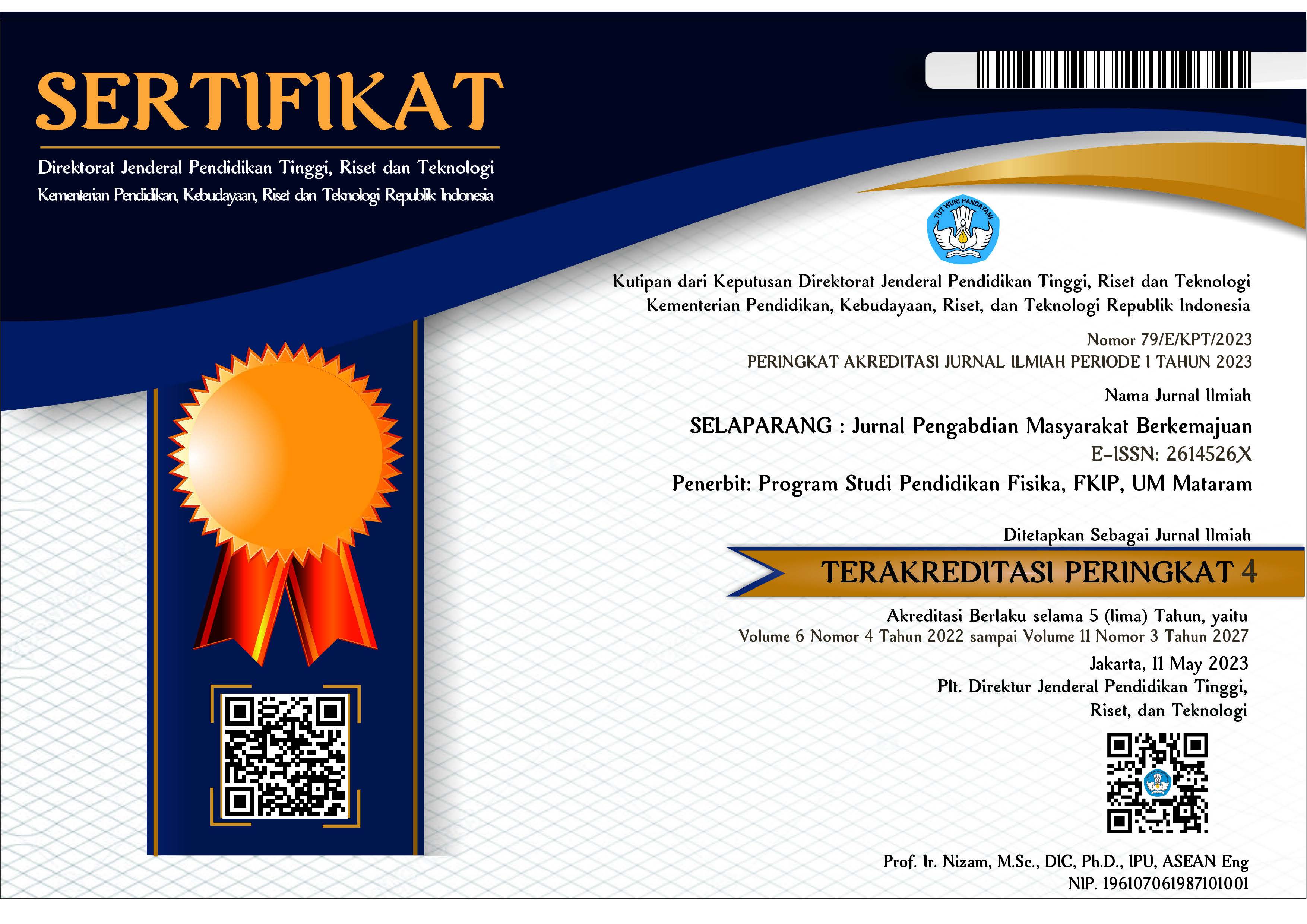Penguatan guru mengatasi kerentanan mental siswa melalui pelatihan hypnoteaching berbasis siklus experiential learning
Abstract
Abstrak
Bullying atau perundungan di sekolah adalah masalah yang signifikan di seluruh dunia, mempengaruhi perkembangan fisik, emosional, dan spiritual individu. Indonesia tidak lepas dari kasus perundungan, termasuk kasus yang terjadi di lingkungan sekolah. Demikian pula kasus bullying di labschool, mulai dari kasus ringan sampai dengan sedang. Secara spesifik, belum terdapat kasus bullying yang mengkhawatirkan melainkan sekadar bullying antar teman yang tidak mengakibatkan dampak serius. ituasi perkembangan siswa yang mengalami kerapuhan mental dan motivasi, baik disebabkan kondisi rumah maupun lingkungan sekolah menambah panjang daftar permasalahan di sekolah. Salah satu elemen yang penting dalam mengurangi risiko demotivasi dan kerentanan mental adalah guru, baik guru BK maupun guru mata pelajaran. Hypnoteaching sebagai bagian dari peningkatan kapasitas individu dimulai dengan memahami lebih jelas mengenai hipnosis. Kegiatan Pengabdian Kepada Masyarakat (PKM) ini bertujuan untuk memberikan pelatihan hipnoteaching kepada 25 guru yang terdiri dari guru bimbingan konseling (BK) dan guru mata pelajaran Labschool UNESA sebagai bentuk penguatan kerentanan mental peserta didik melalui metode experiential learning. Dengan beberapa praktik di setiap siklusnya dan soal pre dan post tes, terdapat evaluasi yang berlangsung selama satu bulan pengamatan melalui daring antara guru dengan penyelenggara PKM serta pakar hynoteaching. Guru mendapatkan manfaat dari pelatihan ini untuk menciptakan pembelajaran yang menyenangkan dengan kondisi mental siswa yang sehat.
Kata kunci: pengabdian; pelatihan; hypnoteaching; kerentanan mental siswa.
Abstract
Bullying in schools is a significant problem worldwide, affecting the physical, emotional, and spiritual development of individuals. Indonesia is not free from bullying cases, including cases that occur in the school environment. Specifically, there have been no cases of bullying that are merely bullying between friends that do not cause serious impacts. The development situation of students who experience mental and motivational fragility, either due to home conditions or the school environment, adds to the long list of problems in schools. One important element in reducing the risk of demotivation and mental vulnerability is teachers. Hypnoteaching as part of increasing individual capacity begins with a clearer understanding of hypnosis. This Community Service activity aims to provide hypnoteaching training to 25 teachers consisting of guidance and counseling teachers and Labschool UNESA subject teachers as a form of strengthening students' mental vulnerability through the experiential learning method. With several practices in each cycle and pre- and post-test questions, there is an evaluation that lasts for one month of observation through challenges between teachers and community service organizers and hynoteaching experts. Teachers benefit from this training to create enjoyable learning with healthy student mental conditions.
Keywords: keywords: community service; training; hypnoteaching, students' mental vulnerability.
Keywords
Full Text:
PDFReferences
Abregú-Crespo, R., Garriz-Luis, A., Ayora, M., Martín-Martínez, N., Cavone, V., Carrasco, M. Á., Fraguas, D., Martín-Babarro, J., Arango, C., & Díaz-Caneja, C. M. (2024). School bullying in children and adolescents with neurodevelopmental and psychiatric conditions: a systematic review and meta-analysis. The Lancet Child and Adolescent Health, 8(2), 122–134. https://doi.org/10.1016/S2352-4642(23)00289-4
Celdrán-Navarro, M. D. C., Jiménez-Ruiz, I., Leal-Costa, C., Moore, J. R., & López-Barranco, P. J. (2024). Attitudes, Self-Confidence, and Knowledge of Primary Care Professionals towards School Bullying. Healthcare (Switzerland), 12(12). https://doi.org/10.3390/healthcare12121230
Eason, A. D., & Parris, B. A. (2024). The importance of highlighting the role of the self in hypnotherapy and hypnosis. Complementary Therapies in Clinical Practice, 54(October 2023), 101810. https://doi.org/10.1016/j.ctcp.2023.101810
Elyamani, R., Nour, O., Singh, R., Saeed, K., Musa, A., Alkubaisi, N., & Bougmiza, M. I. (2024). The effectiveness of the WHO school mental health package in promoting mental health literacy among secondary school teachers in Qatar: a randomized controlled trial. BMC Public Health, 24(1). https://doi.org/10.1186/s12889-024-19263-6
Fischer, S. M., John, N., & Bilz, L. (2021). Teachers’ Self-efficacy in Preventing and Intervening in School Bullying: a Systematic Review. International Journal of Bullying Prevention, 3(3), 196–212. https://doi.org/10.1007/s42380-020-00079-y
Goodoory, V. C., Khasawneh, M., Thakur, E. R., Everitt, H. A., Gudleski, G. D., Lackner, J. M., Moss-Morris, R., Simren, M., Vasant, D. H., Moayyedi, P., Black, C. J., & Ford, A. C. (2024). Effect of Brain-Gut Behavioral Treatments on Abdominal Pain in Irritable Bowel Syndrome: Systematic Review and Network Meta-Analysis. Gastroenterology, 167(5), 934-943.e5. https://doi.org/https://doi.org/10.1053/j.gastro.2024.05.010
Guo, S., Huang, N., Liu, X., Zhang, S., & Guo, J. (2024). Could school climate moderate the relationship between school bullying patterns and academic burnout in Chinese adolescents: A large cross-sectional study. Journal of Affective Disorders, 361, 146–156. https://doi.org/10.1016/j.jad.2024.06.024
Hajjah, M., Munawaroh, F., Wulandari, A. Y. R., & Hidayati, Y. (2022). Implementasi Model Experiential Learning Untuk Meningkatkan Kemampuan Berpikir Kritis Siswa. Natural Science Education Research (NSER), 5(1), 79–88. https://journal.trunojoyo.ac.id/nser
Hinze, V., Montero-Marin, J., Blakemore, S. J., Byford, S., Dalgleish, T., Degli Esposti, M., Greenberg, M. T., Jones, B. G., Slaghekke, Y., Ukoumunne, O. C., Viner, R. M., Williams, J. M. G., Ford, T. J., & Kuyken, W. (2024). Student- and School-Level Factors Associated With Mental Health and Well-Being in Early Adolescence. Journal of the American Academy of Child and Adolescent Psychiatry, 63(2), 266–282. https://doi.org/10.1016/j.jaac.2023.10.004
Kim, S., Raza, M., & Seidman, E. (2019). Improving 21st-century teaching skills: The key to effective 21st-century learners. Research in Comparative and International Education, 14(1), 99–117. https://doi.org/10.1177/1745499919829214
Kolb, A., & Kolb, D. (2011). Experiential Learning Theory: A Dynamic, Holistic Approach to Management Learning, Education and Development. In Armstrong, S. J. & Fukami, C. (Eds.) Handbook of Management Learning, Education and Development. https://doi.org/10.4135/9780857021038.n3
Kolb, D. A. (1984). Experiential Learning: Experience as The Source of Learning and Development. Prentice Hall, Inc., 1984, 20–38. https://doi.org/10.1016/B978-0-7506-7223-8.50017-4
Kolb, D. A. (2014). Experiential Learning: Experience as the Source of Learning and Development 2nd Edition, Kindle Edition (2nd editio). Person FT Press.
Mali, D., Lim, H.-J., Roberts, M., & EL Fakir, A. (2023). An analysis of how a collaborative teaching intervention can impact student mental health in a blended learning environment. The International Journal of Management Education, 21(3), 100853. https://doi.org/https://doi.org/10.1016/j.ijme.2023.100853
Novianti, I., & Mulyaning, E. C. (2020). Increasing mathematical understanding ability using quantum teaching hypnoteaching-based in elementary school teacher education students. Journal of Physics: Conference Series, 1657(1). https://doi.org/10.1088/1742-6596/1657/1/012090
Novianti, I., Mulyaning, E. C., & Priatna, N. (2019). Increasing mathematical communication skill using Quantum Teaching based on Hypnoteaching (QTH) in the Primary School Teacher Education (PSTE) students. Journal of Physics: Conference Series, 1280(4). https://doi.org/10.1088/1742-6596/1280/4/042031
Saleh, H., Suryadi, D., & Dahlan, J. A. (2018). Promoting students’ mathematical problem-solving skills through 7e learning cycle and hypnoteaching model. Journal of Physics: Conference Series, 948(1). https://doi.org/10.1088/1742-6596/948/1/012037
Spencer, G., & Thompson, J. (2024). Children and young people’s perspectives on disasters – Mental health, agency and vulnerability: A scoping review. International Journal of Disaster Risk Reduction, 108(October 2023), 104495. https://doi.org/10.1016/j.ijdrr.2024.104495
van Aalst, D. A. E., Huitsing, G., & Veenstra, R. (2024). A Systematic Review on Primary School Teachers’ Characteristics and Behaviors in Identifying, Preventing, and Reducing Bullying. International Journal of Bullying Prevention, 6(2), 124–137. https://doi.org/10.1007/s42380-022-00145-7
Zhu, Q., & Wang, C. (2024). Bullying prevention training for Chinese preservice teachers’ efficacy and beliefs toward bullying. Psychology in the Schools, 61(7), 2864–2879. https://doi.org/10.1002/pits.23194
DOI: https://doi.org/10.31764/jpmb.v8i4.27369
Refbacks
- There are currently no refbacks.

This work is licensed under a Creative Commons Attribution-ShareAlike 4.0 International License.
______________________________________________________
Jurnal Selaparang
p-ISSN 2614-5251 || e-ISSN 2614-526X
EDITORIAL OFFICE:



















